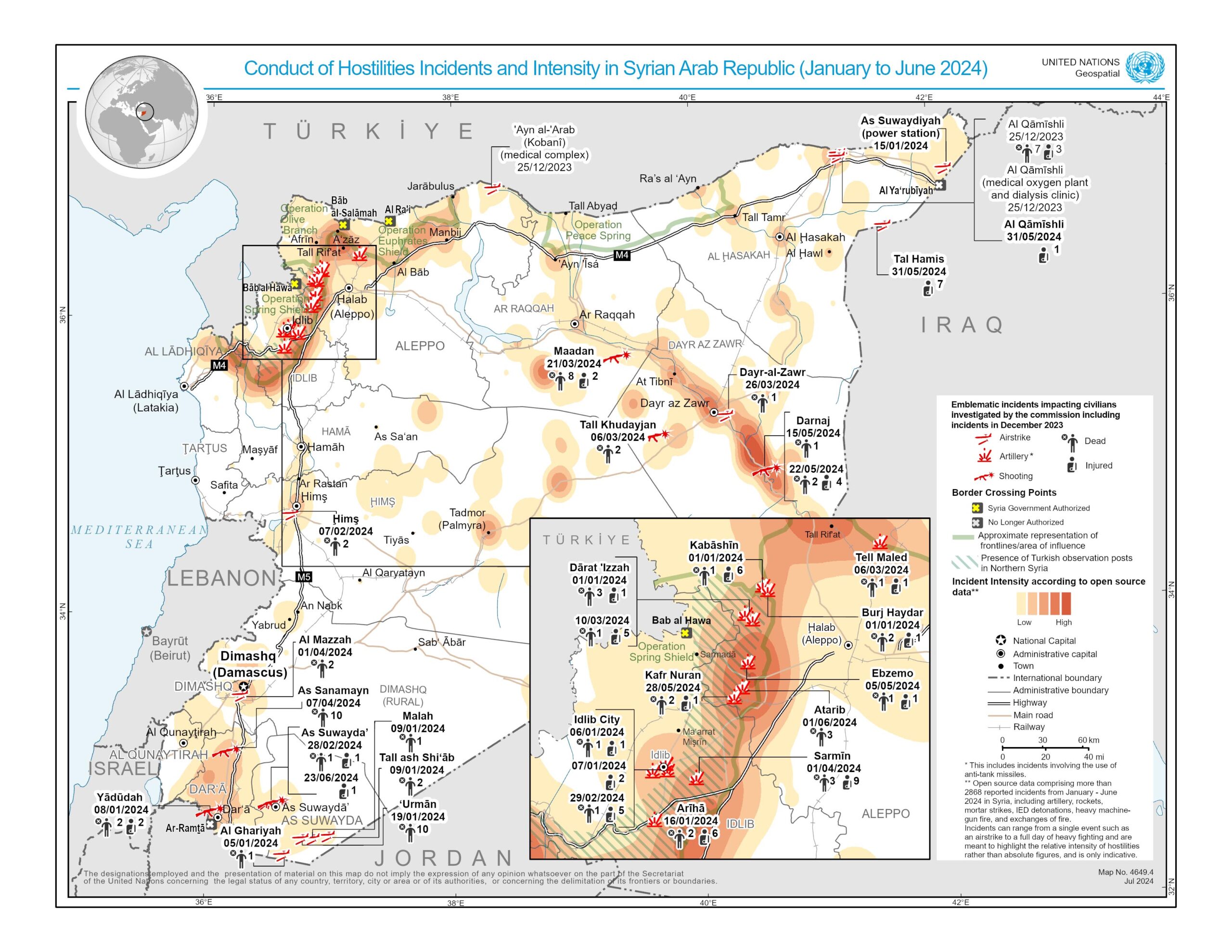A recent report from the UN Independent International Commission of Inquiry on Syria, released on September 10, 2024, warns of escalating violence across the country, raising fears of a “large-scale war.” Civilians are increasingly caught in the crossfire as hostilities continue across various frontlines. The report covers the period from January to June 2024 and highlights how war crimes and human rights violations are being committed by all parties involved in the conflict.
Increased Hostilities in Northeast Syria:
One critical focus of the report is the conflict in northeast Syria, particularly in the Deir-ez-Zor region. Clashes between the Kurdish-led Syrian Democratic Forces (SDF), Arab tribes, government forces, and Iran-backed militias have exacerbated tensions and fueled long-standing grievances. The report states that these clashes are a direct reflection of broader regional instability and warns of the potential for more widespread violence. Paulo Pinheiro, Chair of the Commission, remarked: “The direct fighting in northeast Syria around Deir-ez-Zor evokes deeply entrenched grievances among the population in this part of the country”
Regional Tensions and External Influence:
The report underscores the impact of external forces, with conflicts in neighboring regions like Gaza influencing Syria’s situation. Notably, Israeli airstrikes targeting Iranian officials and proxies in Syria have resulted in significant casualties. The Commission documented multiple airstrikes, including one on April 1, 2024, in Damascus, which killed 16 people, including seven Iranian military advisers and two civilians. The attack raised concerns about violations of international humanitarian law, particularly regarding precautions and proportionality.
Iranian-backed militias have retaliated by attacking U.S. bases in eastern Syria over 100 times during this period. The report warns that such actions risk further escalation and the involvement of even more external actors.
On 1 April 2024, an Israeli airstrike on a building rented by the Consulate of Iran in Damascus killed 16 people, including seven senior Iranian military advisers and two civilians. The report notes that “such attacks raise concerns regarding respect for the principles of precaution and proportionality under international humanitarian law.”
Civilian Casualties and War Crimes:
The Syrian government’s use of cluster munitions—banned under international law—remains a grave concern. The report confirms that in Idlib alone, over 150 civilians, including women and children, were killed or injured in these attacks during the first half of 2024. Russian airstrikes have also led to significant civilian casualties, and the Commission suggests that these acts may amount to war crimes.
Acts of Torture and Detention:
The Syrian government continues to engage in torture, enforced disappearances, and inhumane treatment of detainees. Despite an order from the International Court of Justice (ICJ) to cease such practices, deaths in state custody remain common. One detainee, held in the notorious Military Intelligence Directorate (MID) Branch 235, known as the “Palestine Branch,” detailed his torture experience, which included beatings, sleep deprivation, and denial of medical care. The report also highlights that these acts continue to meet the threshold for crimes against humanity.
A Deepening Humanitarian Crisis:
Syria’s humanitarian crisis is worsening, with only 20% of the 2024 humanitarian response plan funded by mid-year. Over 13 million people face acute food insecurity, and more than 650,000 children are severely malnourished. The report also states that nine out of ten Syrians now live below the poverty line, emphasizing the need for immediate international support.
The UN Commission’s report provides a bleak outlook for Syria, warning that without urgent intervention, the conflict could escalate into a large-scale war. It calls for immediate action to halt the violence, protect civilians, and address the root causes of the conflict. International actors must play a more active role in curbing external military interventions and supporting humanitarian efforts to prevent further deterioration of the situation.



















